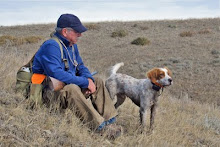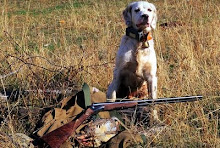
Many people seem to have the idea that a field trial is a sort of greyhound race, and that trial bred dogs are useless to the hunter who walks behind his dog. This view has been promulgated by the many outdoor scribes who are long on opinions and short on actual experience. People read their words and believe and repeat them. It becomes 'fact' because everyone 'knows' it is true. Other folks are skeptical that field trialing achieves the goal of improving the breeds of bird dogs.
But are these common perceptions really based in fact? Let us consider for a few minutes what qualities the IDEAL bird dog might have...
1. Endurance - a bird dog should be able to hunt at a good clip for a reasonable amount of time. My average hunt for birds in the West is between four and seven hours. I don't usually have the priviledge of looping back to my truck to exchange dogs, so I need a dog that can go the distance. I doubt that there are many hunting venues that ask more in terms of endurance than a day of chukar hunting in the river canyons of the Northwest. For this reason, I have put endurance first on the list. It may be less important to you.
2. Nose - without the physical ability to detect birds, a dog is decoration at best.
3. Intelligence – a dog must develop ‘bird sense’. By this I mean the ability to learn and retain the skills required to efficiently search out birds and to handle the birds so that the hunter is allowed the best opportunity for a shot. This requires some intelligence in the dog.
4. Ground application - the ideal dog is effective at hunting the available terrain and cover by intelligent application and must have the physical ability to get this done in all types of terrain in any weather that the owner may want to hunt or trial in. The dog needs to look at the terrain and cover and set off to search the high probability areas for birds. He should be swift, and not potter around every clump of cover.
5. Biddability - I am not a professional trainer. Like most amateurs, I want a dog that has a lot of natural ability AND that takes training quickly and retains it.
6. Handle - a dog that wants to be with its owner and is naturally inclined to please that owner will learn to hunt co-operatively and happily. It will be easy to teach, and eager to go about the business of finding birds for its owner. It seems that some dogs handle to the front and co-operate naturally.
7.. Temperment - My dogs, and I am sure many of yours, live with me year around, and are my constant companions. I want them to be calm and mannerly around me, my family, strangers, and other dogs - especially when hunting or trialing.
8. Style - as long as I am asking for all the attributes above, why not ask for a dog that looks great running and on its birds? Because we have to look at them, we may as well like what we see.
Most hunters who love dogs would like to have dogs with the appropriate mix of the qualities above. And it is no big leap to understand that field trialers seek the same qualities in the dogs they trial - and in many cases hunt behind. A trialer may value some of these attributes above others, depending on the venue he (or she) trails in, but they do want them all, and they judge dogs based in large part upon these attributes. Trialers, judges and breeders are all looking for "the whole package". This is true whether the trailer is running foot handled cover dogs, walking Shooting Dogs, or horseback handled Shooting Dogs and All-Age dogs. The ultimate goal of field trialing is to breed and demonstrate dogs with these qualities. While perfection is seldom, if ever, attained, it can be approached. But even the best breed dog must be developed and trained. Without this all is for naught.
Many a hunter’s ‘brag dog’ has field trial breeding close up in their pedigree.
Field trials are not won on race alone. They are won by successfully finding and handling birds, since few judges want to put up a dog that has not shown that it can do so. Race is important relative to the objective of good ground application and completing the course on time. A dog that can trial hard for one to three hours is not going to have a problem hunting at a more moderate pace for twice as long. If the dog is fast and stylish, and handles well while hunting intelligently, and shows that it can find and correctly handle birds, then that dog will be on the judges' short list. Judging in AF trials and most other trails is highly subjective - as it should be. The objective, remember, is selecting the dog that, on that day, in that trial, showed that it best fulfilled the qualities that the judges were seeking and was not just racking up bird counts.









5 comments:
Mike: I'd largely agree with you on your post -- if for no other reason than any bird-finding format like FT'ing keeps exposing a dog to birds and stimulating its drive to hunt.
However, for the sake of gentlemanly banter, would you agree that field-trial exposure (while largely fine for the dogs) can also bring out the worst in human handlers? Or that the whole idea of naming 'Champions' encourages a kind of stupidity on the part of potential owners -- who think that a pup's sire's AFC title means they don't need to learn how to train a dog that genetically gifted?
best
Andrew
Andrew,
It seems that almost anything can bring out the ugly side of people. But most of the people I meet when trialing (almost ALL, in fact) are sportsmen who go out of their way to help each other. This was certainly true when I began trialing, and it has not changed. I believe that it is sometimes linked to the type of organization, who it attracts, and why.
What you say about the stupidity of some owners is true - but would likely be true regardless of the dog they owned. One thing has been demonstrated to my satisfaction... a well bred dog that has natural ability and inclination to hunt makes the trainer look good. Sometimes the dog just needs to go hunting, and it will figure it all out for itself. But even this dog will never realize its real potential without training.
Mike: couldn't agree more. I'm wrestling with a young dog who has so much natural ability and drive(in part because he has had a lot of bird exposure) that a bird field drives him nuts. And training is the only thing that at this point is going to help shape that intensity into a great dog.
Do you think that the reason for some of our different respective experiences with the FT crowd might be regional?
best wishes
A.
Andrew:
I tried AKC trialing years ago. I did not like the 'birdfield' idea at all. Didn't seem to reward the dog that really hunts. To be fair, though, they seem to have moved to a AF field model in terms of the events they run now - but the CH titles are awarded on points instead of just winning a championship.
So I run in AF and AFTCA/US Complete trials with my trial setters now, and the events are less 'political' and the people are very helpful.
I got involved in HB trialing, and it's great fun. But I am also working to introduce US Complete (walking) Shooting Dog trials to the West Coast, and finding good acceptance among the HB trial people. I am. I think. NW Region president, since I got stuff started here. Walking trials over a continuous course with trained, broke dogs is very enjoyable, and very low pressure.
It IS supposed to be FUN, right?
Again, nice response, Mike. I don't know enough about AKC FTs to defend their or American Field's trial formats. But one common theme I've heard about field-trialing out here is that guys, almost exclusively, like the 'idea' of field-trialing... the 'champions,' the horses... and forget that it's the dogs that make all of this fun.
I'm always up for walking. Thanks for doing your best to bring it to the Left Coast.
A.
Post a Comment